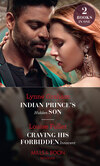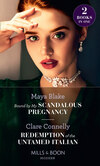Kitabı oku: «The Italian's Rags-To-Riches Wife», sayfa 2
‘Get me Tomaso on the phone,’ he ordered savagely. ‘Now!’
CHAPTER TWO
LAURA picked up the post that had fallen through the letterbox, her expression bleak. Yesterday’s post had brought grim news. A final reminder from the taxman warned her that late payment would incur interest charges, and a letter from the auction house had valued the remaining antiques at considerably less than the sum the taxman required.
Despair and fear were gnawing at her. Day by day she was edging closer to the bleak prospect of having to sell Wharton. Her heart clawed at the thought.
I can’t sell! I just can’t! There has to be something—something I can do to keep it going!
If she could just pay the taxman, she would have a chance. She could raise a mortgage on the property and then use the money to convert the house into a holiday let, as planned. The lettings would then pay the mortgage and maintenance costs. But if she couldn’t pay the tax…
Desperation knifed through her again.
As she continued to consider her bleak future, her hands stilled suddenly on one of the letters. It was a thick white envelope, and the stamp was Italian. Grimly she ripped it open. Inside were three things: a letter, an airline ticket…
And a cheque.
A cheque drawn on Viale-Vincenzo. In a sum that brought a rasp to her throat.
Slowly she looked at the letter, written on company paper. It was not informative, merely drew her attention to the enclosed cheque and ticket. As she flicked open the ticket she saw it was from Heathrow to Rome, and was dated for a week’s time. It was also executive class. Attached to the back of the letter was a second page of closely printed Italian that she could not understand. Obviously this document must explain that the cheque was a gift in return for her visiting her grandfather in Italy.
Carefully, Laura replaced everything inside the envelope, and went to sit down at the kitchen table. She stared at the envelope in front of her, so different from yesterday’s communication from the Inland Revenue and the auctioneer.
Suddenly temptation, like an overpowering wave, swept through her.
I’ll pay the cheque back—every last penny, with interest!—once I’ve got the mortgage through. But the taxman won’t wait—I’ve got to settle that first, in any way I can!
But not this way, she riposted mentally. She couldn’t touch a penny of Viale money! Her grandfather would turn in his grave if she did—especially after the way Stefano Viale had treated his daughter..
But surely the Viale family owed him, too?
They owe you—and your mother, and your grandparents—for all the years of struggle, because of what your father did. They owe you…
Not a penny in child maintenance had her mother received. It had been Laura’s grandparents who had kept her and her mother, who had brought her up, paid for her education and keep, shod and housed her. Stefano Viale—whose father, according to the handsome lordly gofer who had told her, was one of the richest men in Italy—had not parted with a penny of his money.
The cheque’s just back-payment. That’s all!
But if she did take the cheque, she would have to do what it was bribing her to do. Her stomach hollowed. She would have to go to Italy and face her father’s family.
Her face hardened. She had to save Wharton. It was her home, her haven! She had always lived here, helping to take the burden of its upkeep off her increasingly frail grandparents. She couldn’t lose it now! She just couldn’t! She stared blankly at the cheque in her hand, stomach churning.
I’m going to have to do it. I’m going to have to go to Italy. I don’t want to—I don’t want to so badly that it hurts. But if I want that money—money I need to help save Wharton—then I’m going to have to do it.
Laura stared out of the porthole over the fleecy white clouds, her expression tight. With every atom of her body she wished to heaven she was not here. But it was too late now. She was on her way, and there was nothing she could do about it.
‘Champagne?’ The flight attendant, a tray of foaming glasses in her hand, was smiling down at her, as if she didn’t look totally out of place in an executive class seat.
‘Thank you,’ said Laura awkwardly, taking a glass. Well, why not? she thought defiantly. After all, she had something to drink to.
She lifted her glass a fraction.
‘To Wharton,’ she whispered. ‘To my home. And damn my father’s family!’
A man was holding up a sign with her name on it as she walked out into the arrivals section at Fiumicino airport. Landing in Rome had been strange. She had seldom been abroad. There had been a school trip to Brussels, and her grandparents had once taken her to the Netherlands. But Italy, of course, had been out for obvious reasons.
And she didn’t want to be here now. Resentment, resistance, and a horrible churning emotion she could not name sat heavily on her as she clumped after the man holding the sign, who was now carrying her single piece of luggage. Outdoors, the difference in temperature from still-wintry Devon struck her. It was not warm, but it was definitely mild. Thin sunshine brightened the air, but it could not brighten her mood. The ordeal ahead of her suddenly seemed very real. She clenched her jaw and climbed into the back of the smart black saloon that had been sent for her.
It was only as she sank into the deep, soft leather of her seat that she realised she was not alone in the car.
Allesandro di Vincenzo sat beside her. His dark eyes surveyed her critically.
‘So,’ he said, ‘you finally came. I thought the fat cheque I paid you might change your mind.’
His voice was caustic, as was the look he gave her.
The intervening time since his rain-sodden descent on Laura Stowe had not improved her looks, observed Allesandro critically. She looked every bit as much of a fright now as she had then. Oh, she’d clearly made some degree of effort to look less bedraggled than before, but to hopeless effect. Although she was no longer wearing those unspeakable corduroy trousers and that thick unravelled jumper, her skirt was ill-fitting, clearly cheap, and her blouse bagged around her bust and waist. She wore thick stockings and heavy-soled flat shoes. Her hair was unkempt, completely unstyled, and still tied back with an elasticated band in a clump at the back of her neck. Her eyebrows still beetled across her brow, and she wore no make-up whatsoever. As his gaze narrowed, he knew why. Because it wouldn’t do anything for her.
Nothing could—that much was obvious.
His mouth tightened. Tomaso was welcome to her. After this second round of even more base manipulation, Allesandro’s sympathy for Tomaso was at rock-bottom—even allowing for the old man’s emotional state. He would deliver the girl and get back to his life—running Viale-Vincenzo, at least as CEO again, even though Tomaso was still holding out on the chairmanship. If the old man reneged on that again, now that he’d actually delivered the damn girl to him…He snapped his mind away and opened his laptop, immediately burying himself in work and ignoring the other passenger in the car.
Laura spent the journey staring out of the window. They seemed to be heading deep into the Italian countryside, rather than heading into Rome. But wherever her grandfather was, she didn’t want to meet him.
She also didn’t want to be in a car with Allesandro di Vincenzo. It had been an unpleasant surprise to see him again. A discomforting one. She’d always done her best in life to avoid the company of men, removing herself before they did. A man who was as ridiculously good-looking as Allesandro di Vincenzo, with all his expensive glamour and effortless sex appeal, simply made her even more acutely uncomfortable. Even without all the business about her father and his family, it was totally obvious that a man like that would endure her company only under duress.
A shuttered look showed in her face. She’d read somewhere that beautiful women and handsome men tended to be nicer than those not so beautiful or handsome. The reason, the article had explained, was that the beautiful people had always been feted and welcomed and admired, and so naturally they found the world a good place to live in. Plain people, like herself, were far less sure of a welcome by others. It made them awkward and self-conscious, uncertain.
Well, that was true of her, she thought, staring up through the windscreen. She’d felt an outsider all her life, thanks mainly to the circumstances of her birth. But then adolescence had arrived, bringing home to her the tough truth about her appearance, and that sense of being an outsider—shut out from the normal activities of her age group—had been exacerbated a thousand times.
Laura had finally realised that she had two choices in life. Either to be bitter about being so unattractive, or to get over it and move on. There were other things in life that were worthwhile, and if she just totally ignored her own appearance then she wouldn’t be bothered by it.
And now she refused to be troubled by it. She wore clothes she could afford, which were serviceable and comfortable. She didn’t bother about her hair—never spending money getting it cut, just tying it back out of the way. And as for make-up, she’d save her money for something more useful. Like groceries and bills.
And what did she care about a man like Allesandro di Vincenzo, as alien to her as if he’d come from another planet, looking at her with disdain? It was a lot easier when he was doing what he was doing now—completely ignoring her. Immersed in his laptop, he tapped away at the keyboard.
He must, she realised, be a key part of Viale-Vincenzo. He was clearly rich, and there was an aura of command about him even though he must only be in his early thirties, she surmised.
She gave a private sour smile as she gazed out of the window, then deliberately forced her mind away from the man in the car. Instead, she looked at the passing countryside as the car sped smoothly along the autostrada.
This was Italy—the cypresses, the olive groves, the fields and the hills, the vineyards and the red-tiled houses. All bathed in sunlight.
This is my country, as much as England is.
Something stirred inside her, but she crushed it down. She might be half-Italian, but it was by accident only, not intent. Her upbringing was English—all English. This was an alien place. She did not belong here. It meant nothing to her. Nothing at all.
Deliberately, she started to run through all the repairs that needed doing at Wharton. That was the only place that meant anything to her.
Not anything here.
Laura got out of the car and looked around her. Involuntarily, her eyes widened. The house in front of her was huge. A grand, aristocratic villa, no less, made of cream-coloured stone. Sash windows marched along the frontage, winking in the sunlight and on the other side of the gravelled drive on which the car had drawn up formal gardens stretched away down a gentle slope. Even at this time of year she could see the grounds were perfectly manicured.
Tension knotted inside her like a ball of steel wool.
She was here, in Italy. Inside this vast house was her only living relative. The father of the man who had fathered her. Father of the man who had destroyed her mother with his callousness and cruelty, and who had refused to acknowledge his own daughter’s existence.
She wanted to run. Bolt. Get away as fast and as far as she could. She wanted to go home, be home—the only home she had ever known, the only home she wanted. She wanted nothing, nothing of what was here.
She stared about her. That strange pang came again, very deep within. If the man who had fathered her hadn’t been the complete bastard that he had, she might have known this place. Might have been brought here for holidays. Might have run laughing through the gardens as a child. Her mother might have been here too—alive and happy with the man she loved…
But Stefano Viale had not been interested in love, or marriage, or his own daughter. He had made that very, very plain.
Inside her head, she heard again her grandmother’s stricken voice.
‘He never wrote, not once. Never answered any of your mother’s letters. She was heartbroken—just heartbroken. Not a single letter, not a single kind word to her. He’d taken her innocence, used her and thrown her away!’
Laura’s expression hardened. That had been the reality she had grown up with.
Father? She didn’t have one. She never had.
And she didn’t have a grandfather either. Whatever the man waiting for her inside wanted to call himself.
‘This way.’
The terse, impersonal tones of Allesandro di Vincenzo interrupted her baleful thoughts. She was being directed indoors, and with an increasing sense of oppression she walked inside into a vast marble-floored entrance hall.
Allesandro strode past her, towards a pair of double doors beyond. He threw them open and walked in. Tomaso was there, at his desk by the window. He looked up immediately. There was a taut expression on his face. Tense. Expectant.
Suddenly, for all that the old man had manipulated him shamelessly, Allesandro felt he could not do this to him. He should go in first, warn the old man what he was about to get by way of a granddaughter. Then he crushed his compunction. Tomaso was playing hardball—deliberately using Allesandro’s desire for control of Viale-Vincenzo in order to make him do what he wanted. And if what he wanted was his deeply unpleasant granddaughter, he could have her.
Behind him Allesandro could hear the heavy plod of unfeminine feet shod in flat clumpy shoes that no Italian woman this side of a lunatic asylum would even have possessed, let alone worn.
The old man was getting to his feet.
‘Tomaso—your granddaughter,’ announced Allesandro, his voice studiously expressionless. ‘Laura Stowe.’
But Tomaso was not looking at him. He was staring past the younger man to the female figure that had walked in behind him. Allesandro watched his face as the old man’s expression changed.
It became bland, unreadable.
‘Laura—’ said Tomaso, and held his hand towards her.
The girl was standing there, ignoring the hand that stretched out to her. Her face was shuttered, the way it had been the entire journey. The lack of expression made the girl look like a pudding—one of those stodgy English ones, with suet in them.
‘I am your grandfather,’ said Tomaso. The face might be bland, Allesandro thought, eyes narrowing minutely, but the voice was not. It was audibly suppressing emotion.
Something flickered angrily in the girl’s face.
‘My grandfather is dead. You are merely the father of the man who ruined my mother’s life.’
The aggression in her tone was unequivocal. For a moment Allesandro saw new emotion in Tomaso’s face. Shock. Naked and raw.
The girl held her pitiless gaze.
‘The only reason I’m here,’ she told him, ‘is because that man—’ she nodded curtly in Allesandro’s direction, and he felt a spurt of vicious anger both at her manner, and at what he knew was coming next ‘—bribed me to come.’
‘He bribed you?’ The old man’s voice was a disbelieving echo.
‘Yes.’ Allesandro watched, aghast, as the girl spoke bluntly. ‘I don’t want anything to do with you, or anyone connected with the man who treated my mother so unforgivably! I can’t imagine why you thought I would have the slightest desire or interest in meeting you—any more than the man who fathered me had the slightest desire or interest in my existence, or in what he’d done to my mother!’ A sharp, tight breath made her pause, and then she went on. ‘I’m sorry your son is dead—but it’s nothing to do with me. Nothing. Because your son wasn’t anything to do with me. He made that totally clear even before I was born!’
Shock edged Tomaso’s face. ‘This is not how I—This is not—’ He faltered. He looked across at the girl, half turned away. ‘I thought—I thought you would be glad—glad that I had sought you out…’
His face greyed, and then suddenly his hand was clutching at his heart. Allesandro started forward, catching him as he fell.
The next hour was endless. Allesandro had immediately summoned an ambulance, and Tomaso had been rushed to hospital. To Allesandro’s relief he was soon pronounced out of danger, even though he was being kept in overnight for monitoring.
Whatever kind of seizure Tomaso had had, Allesandro knew only one thing. That harpy, with her venomous tirade, had been responsible. His eyes darkened now, as he glared at the girl sitting stony-faced in the car taking them back to Tomaso’s villa. Her hands were clenched in her lap. She’d sat just like that in the hospital lobby while Allesandro had accompanied Tomaso into the ward.
‘Is he going to be all right?’ she asked suddenly.
‘You care?’ Allesandro derided.
‘I told you—I’m sorry his son is dead, and I’m sorry he collapsed. I wouldn’t want him to die. I wouldn’t want anyone to die.’ Her voice was terse and jerky.
‘Big of you,’ he replied. ‘But if you really want to be big, you’d better do what he wants and stay at the villa until he’s well enough to see you. God knows why he should want to, but he said he did before I left him.’
He got no answer from her, only a shoulder turning away from him, maximising the distance between them. The movement irritated him. If there was a female in the world less likely to engage his interest, she was beyond imagining.
CHAPTER THREE
LAURA sat on the bed in the bedroom she’d been shown to by one of the household staff, and stared out of the window. The view was beautiful. Formal Italianate gardens, just like in a guidebook, and then a vista of olive groves, narrow dark cypresses and rolling hills.
She turned away. She didn’t want to see it. Didn’t want to be here. Didn’t want to be in Italy, in her grandfather’s villa—
He’s not your grandfather—don’t think of him that way!
Genes didn’t make you family. She had half her father’s genes, but that didn’t make her his daughter. It certainly hadn’t in his eyes, anyway.
She lay back on the bed. She was tired. She’d had to catch an early bus to Exeter, then the coach to Heathrow, then the flight here. Her eyelids grew heavy…
She must have nodded off, because the next thing she knew there was a maid in the room, informing her that dinner was served. Reluctantly Laura went downstairs, prudently taking a book with her. She’d have rather eaten in her room, but didn’t want to be a nuisance.
A manservant waiting at the foot of the sweeping stairs conducted her to a room opening off the hall. She walked in, and stopped dead.
Allesandro di Vincenzo was there, already seated at the table. As she clomped in he got to his feet. There was a sheaf of papers beside his place, and he’d obviously been reading them.
‘I thought you’d gone,’ she blurted, before she could stop herself.
‘Alas, no,’ came his reply. It was smooth, but terse. And very unfriendly. ‘Much though I would have preferred to return to Rome, I would not dream of abandoning a hospitalised Tomaso to nothing more than your loving presence.’
Laura felt colour mottle her cheeks.
‘How is he?’ she asked, as she went and took the only other place laid at the vast table—directly opposite Allesandro. It made him seem closer than she wanted him to be. But then she didn’t want him anywhere near her at all anyway.
The feeling was doubtless mutual, she realised, intercepting a black look from him as she pulled in her chair.
‘His condition is stable,’ he said. ‘As if you care.’
Her colour mounted. ‘I don’t want him to die—I told you that.’
‘And as I told you—that’s big of you,’ Allesandro returned. He frowned. ‘Do you have nothing better to wear for dinner?’ he demanded, his eyes flicking dismissively over her clothes.
‘No,’ said Laura. If she’d known he was going to be here she’d have insisted on a meal in her room. He was the last person she wanted to spend time with. She opened her book and started to read. To her relief, her unwelcome dining partner returned his attention to his papers.
The meal that followed was ludicrously formal, to Laura’s mind. There were too many courses, and it went on for ages. The only compensation—for the company was even worse than the formality and the length of the meal—was the food, which was incredibly delicious. As she scraped up the last of the delicious sauce accompanying the beautifully cooked lamb, Laura realised she was under surveillance.
‘Do you always eat so much?’
Laura stared blankly. She liked food. She always had. Comfort eating, the magazine articles called it, but she didn’t care. Her lifestyle was not sedentary, and with all the sheer physical slog of looking after Wharton, plus the long, solitary walks she loved to take through the countryside, she had a good appetite. ‘Sturdy’ her grandmother had always called her. Probably she would run to fat when she was middle aged—as her grandmother had.
Now, she swallowed the last mouthful, put her cutlery back on the plate, and said baldly, ‘Yes.’
Then she went on reading.
Allesandro glowered from his seat across the table. None of the women he knew could put food away like that. Even though it was impossible to see her figure in those shapeless clothes, if she were eating like that she could hardly be anything but overweight. He went back to his report on market conditions in South America. Laura Stowe could be the size of an elephant for all he cared.
The following day the hospital phoned to say that Tomaso was up to receiving visitors. Relieved, Allesandro marshalled Laura into the waiting car. As she sat, her hands twisting uneasily in her lap, he suddenly asked, ‘What is wrong with your hands?’
She glanced down. ‘Nothing. Why?’
He hadn’t noticed them before. But then, it was hard to when there was the rest of her unappealing appearance to attempt to ignore.
‘They are covered in scratches,’ he said.
She shrugged. ‘They’re healing. I was clearing some brambles in the garden the day before I came out here.’ She turned her hands over. The palms were just as scratched, plus rough and callused.
‘What do you do to yourself?’ he demanded.
She looked at him expressionlessly. ‘I work. Wharton doesn’t look after itself.’
His face tightened. ‘You have staff, surely?’
She rolled her eyes. ‘Oh, yes—four housemaids and just as many gardeners!’
He took a breath. ‘Well, perhaps now, with the money I paid you, you can afford to hire some help.’
‘I doubt the Inland Revenue will see it that way,’ she said dryly.
‘Como?’ Allesandro’s eyebrows drew together.
‘Your cheque paid off the first tranche of death duties I owe. That’s why I accepted it. I’d have torn it to shreds otherwise. But…’ she shrugged, looking at him defiantly ‘…I’m going to fight tooth and nail to keep Wharton. And you’ll get your money back, Signor di Vincenzo. I assure you. When I’m finally earning money from holiday lets at Wharton—’
‘You think someone will pay to stay there?’ Allesandro interjected incredulously. ‘It’s a rain-sodden, decaying wreck!’
Her chin lifted. ‘I’ll renovate it,’ she said. ‘I won’t sell up unless I’m absolutely forced to!’
Allesandro was looking at her strangely.
‘You are attached to the place?’ He made it sound as though she enjoyed eating rotten meat.
‘It’s my home,’ she said tightly.
He gestured with his hand around him. ‘But you have a new home here, for the asking,’ he said.
Her expression tightened even more.
‘And also,’ he went on, with the same strange look in his face, ‘you now need have no more money worries. Your grandfather will lavish on you whatever you want.’
A hard light entered her eyes. ‘What a pity the man he fathered didn’t think to lavish the one thing on his daughter that she actually would have valued—his acknowledgement of her existence!’
Allesandro’s expression changed. ‘Stefano was a—a law unto himself. He did what he wanted. He was—’
‘A bastard,’ said Laura. ‘Like me.’
Her jaw was set. She looked belligerent.
Cussed. Sullen. Ill-tempered.
The familiar adjectives scrolled in Allesandro’s mind. Then another one entered. Where it had come from, he had no idea. But suddenly it was there all the same.
Bleak, with an empty look in her eyes.
He thrust it aside. Laura Stowe wasn’t someone he wanted to feel sorry for.
At the hospital his instructions were terse.
‘Say anything to upset Tomaso and you will be sorry, I promise you.’
Laura only looked away. The last time she’d been in a hospital ward it had been to see her grandfather, the day he had finally died of heart failure, mere months after her grandmother’s death. As she followed Allesandro into the intensive care room, and saw the solitary figure surrounded by instruments and electronics, his body wired up to them and a drip in his arm, she swallowed hard.
The figure in the bed was so frail. As frail as her grandfather had been.
But this is my grandfather. The thought pierced her suddenly.
She shook her head. No—no, it wasn’t! She wouldn’t let him be. She wouldn’t let anything of this touch her. She would block it out of her mind, her life, her existence.
This is nothing to do with me! Nothing!
But as she walked in, the head lying on the white pillow turned towards her.
‘Laura—’
The voice was thin, but it had lifted on her name.
Silently, with clear effort, a frail hand was held out to her.
‘You came,’ he said. Dark eyes rested on her. In them Laura thought she saw something she had not expected to see.
Gratitude.
She walked forward. She didn’t take the hand, and Tomaso let it fall back on the bed. A little of the light went out of his eyes. It made Laura feel bad, but she did not want to touch him.
‘How—how are you?’ she said, her voice stiff and awkward.
There was a flicker in the dark eyes. ‘Better for seeing you. Thank you—thank you for staying. For allowing me—’
He took a breath. It sounded difficult and rasping.
‘Please, won’t you sit down?’
Heavily, she sank down into the chair by the bed. Tomaso’s gaze went past her to the figure standing in the doorway.
‘I’m staying,’ said Allesandro in Italian. ‘I don’t want her upsetting you.’
Tomaso’s expression changed. ‘I think I will be safe enough. Thank you for bringing her to me, Allesandro, but now—’
Reluctantly, Allesandro left. The heart monitor would give the alarm if the crash team were to be needed precipitately. Moodily, he went on pacing up and down the corridor.
Inside the intensive care room, Tomaso’s gaze returned to Laura. She bit her lip. Tension wracked her body. Her throat was as tight as a drum.
‘Laura—my child. I have something I must say to you. I ask you, most humbly, to allow me to say it.’ The rasp in his voice came again. ‘Then, if you still wish, leave and return to England. With my blessing. Should you want it,’ he added, and there was a wry ruefulness in his voice.
He paused a moment, as if he were gathering strength. From the corner of her eye Laura could see the oscilloscope pulse to the beating of his heart. Her own heart seemed to be thudding heavily inside her.
She wanted to go. Wanted to bolt, run, get out of here. March away on heavy, hard feet. March all the way back to England. To Wharton. Shut herself in the house and never come out. Never. But she couldn’t. She couldn’t bring herself to do it. Something kept her glued to the chair. It was probably tension. Nerves. What else could it be?
She felt Tomaso’s gaze on her—as if, she realised, he was steeling himself to say something more. As if he was wary of her reaction. Anxious, even. Then, with that weak rasp still in his voice, he spoke. His eyes rested on her, and his head turned towards her.
‘Lying here has given me time to think. To remember. And I have thought much and remembered much. I have remembered Stefano. Not as I last saw him—not as he was in those last years of his life—but long ago. When he was your age. Younger. Even younger.’
He took a breath, then went on. ‘But I don’t have very many memories of him. Nor as a boy. You see…’ his eyes wavered a moment ‘…I did not spend a great deal of time with him. I was busy making money. Stefano I left to his mother. She doted on him.’ His gaze wavered again. ‘I was too busy to spend much time with her, either. So she lavished on him all the devotion and attention that I was too busy to accept from her. Stefano was always wild, obsessed with his power boats.’
He was silent a moment, whether to gather his strength or to dwell on his dead son Laura didn’t know. She only knew that she was stretched tight, like a pulled wire. She wanted Tomaso not to have spoken. Not to have drawn an image of a boy, a young man, half-neglected, half-spoilt, taking what he wanted and ignoring the consequences.
And that included my mother! He took her and dumped her! And be damned to the consequences—including getting her pregnant!
Anger, familiar like an old hair shirt, rubbed against her.
Tomaso was speaking again. His voice had changed now.
‘A man wishes to be proud of his son. But how can I be proud that my son seduced and abandoned the mother of his child? Ignored her existence—and yours.’ The eyes rested on her, and she could see pain in them. And remorse.
‘It was crass of me. Stupid, insensitive—and selfish—of me to think you could have any wish to know your father’s family,’ he said heavily. ‘All your life you have lived knowing what my son did to your mother, and to you. And for me to think that in an instant everything could be forgiven and forgotten was stupid of me in the extreme. There is anger in you—a lifetime of anger—and I cannot ignore that. I must not.’
Ücretsiz ön izlemeyi tamamladınız.


















